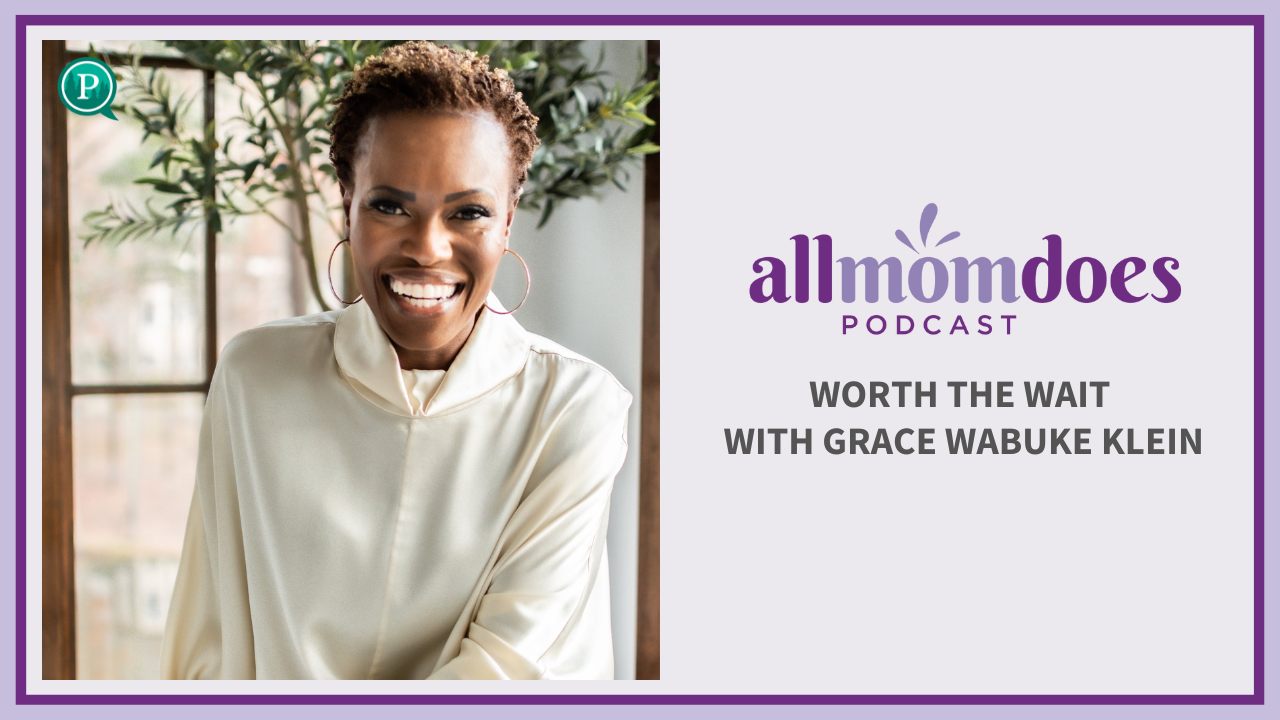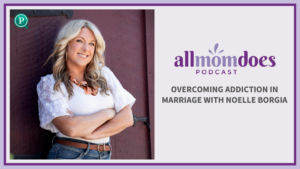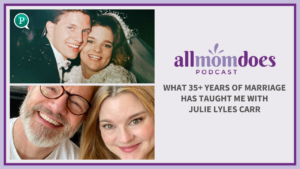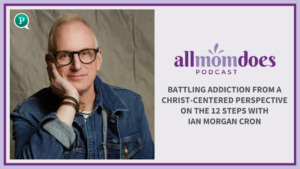Waiting is never fun, particularly when you don’t know what the outcome of that wait will be. Grace Wabuke Klein hits the mic with The AllMomDoes Podcast Julie Lyles Carr to talk about seasons of waiting, seasons of flourishing, and all the the confusing seasons in between.
Show Notes:
Find Grace: Online | Instagram | Twitter
Find Julie: Online | Instagram | Facebook | Twitter | Pinterest
AllMomDoes | Instagram | Facebook | Twitter
Transcription:
Julie Lyles Carr:
I’m Julie Lyles Carr. You’re listening to the AllMomDoes Podcast, where we exist because we want to come alongside you and equip you for the life you’re living and the seasons that you’re going through, whether that is a season of waiting, whether that is a season of super hands-on toddlering, whether that is launching kids, whether that’s a season and a new job. That’s why we’re around, because we want to be a place of inspiration and connection and community. And that is one of the reasons I am so excited to have my guest on today.
Grace Wabuke Klein has been through a lot of seasons in her life and she’s going to sit down with us and talk about what those seasons mean, new ways of thinking about the seasons in your life. We did a series just a while back, and we’ll have Rebecca put this in the show notes, that was about all different kinds of seasons and I definitely think it’s time for a refresher course. So Grace, thanks so much for being with me today.
Grace Wabuke Klein:
Oh, thank you for the opportunity, Julie.
Julie Lyles Carr:
It is great to see you. Well, Grace, give the listener a little snapshot of where you live in the world, what you do, all that kind of stuff.
Grace Wabuke Klein:
Absolutely. So I currently live here in Birmingham, Alabama, but spent most of my life up until the time I got married five years ago in California, both southern and northern where I went to school. But originally, what people say when they see me, I say, “Where are you from?” I was born in Uganda, East Africa, but have grown up here in the US most of my life and I’m so grateful to be here.
Julie Lyles Carr:
Two of my kids have traveled to Uganda and done some work there, and so I have a real affection for that country. And then I was born in Huntsville, Alabama, and then I grew up in Southern California. So I don’t know, I’m feeling some connection here, Grace.
Grace Wabuke Klein:
Absolutely. What a small world. That’s so great.
Julie Lyles Carr:
Exactly. Exactly. Grace, it’s just a feel in this country and I know that it shifts and changes, but we have these places and stations in life where we think certain things are supposed to happen, that there are seasons that we put on this by-age chronological experience. And it starts early, right? Because when you take a kid to the pediatrician, they’re saying, “Okay, well, by the age of two they should do this and the age of four, they should do that,” and we just keep rolling with some of those expectations through a lot of our lives.
I’ve laughed because my husband is someone who I say has been in a midlife crisis since he was 22, just always thought he was behind, behind everybody worried about all these different seasons, but you have a unique story because you had this really vibrant, full life and you had to wait for quite a while before something that you had really longed for happened, and it happened in a season of your life that is not as common for a lot of people. So tell the listener about what that was that you were waiting for, when it finally happened and what age, and what that season of waiting was like.
Grace Wabuke Klein:
Yes. I am a planner. So when you talk about having your life planned out, I mean from the moment I was in junior high, I was like, “I’m going to get into these honors classes, advanced placement classes, get into a good college.” My plan was to become a doctor because my dad was a scientist, so I wanted to be like him, but interacting more with people. So from there, go to medical school residency, get married by 25 after I finish and have kids by 30 and everything. Life didn’t exist after 30. I’m like, “That’s it.”
Julie Lyles Carr:
Yeah. Yeah, exactly.
Grace Wabuke Klein:
30, what? So I had it planned out and I felt like it was a beautiful plan on an Etch A Sketch. I’m giving away my age right now, but there was these things called Etch A Sketch where you would draw a design and then you shake it and all of a sudden it goes away, and that was my plan. I felt like God took the Etch A Sketch and just shook it up because when I was in college, I felt the Lord put on my heart that instead of healing people through medicine, he was calling me to heal people spiritually, which is eternal. And I fought it at first. I was like, “Oh no. I’ve grown up in the church. I will give, but not actually do it.” Took a few months, but I finally embraced that and served in full-time ministry for 16 years as an associate pastor.
And all throughout that time I had the opportunity to officiate weddings, attend lots of showers, baby showers, wedding showers, all of that, all throughout, trying to celebrate with people while my heart was breaking, Julie, because my greatest desire was to get married and share my life with a man that God had for me. I had grown up in a beautiful Christian home and wanted to have what my parents had. My twenties came and went. It was a little bit easier then because I had my friends, my single friends, we’d hang out. But then my thirties, they started getting married, then they started having kids and I was like, “Lord, what about me?” I didn’t get married until I was 42. 42. I couldn’t believe it. It was so hard at that time of waiting and trusting God. It can be so hard when you’re waiting and it seems like heaven is silent.
I know many on here are moms, so maybe they’re waiting for other things, but we can be waiting for a healing, a financial breakthrough, an answer to a prayer, maybe a child who is gone sideways, no longer walking with God, and we keep praying and asking God to answer. It’s that heartache of how does an all-powerful God see me in this pain and not do something? So I had to make a decision in the midst of all that, am I going to live my life in a cave of depression some people end up doing, or putting their life on hold saying, “I’ll do this when this happened?” But my Bible, Julie, says that Jesus came that I might have life and life abundantly.
Julie Lyles Carr:
Abundant, yeah.
Grace Wabuke Klein:
Not a life of depression or just stagnance. And so I made a decision, I’m going to live with joy and I’m going to live with purpose. I’m going to live this life and not wait for someone to make it happen. I’m complete now. So many movies we see and romantic scenes, it’s like, “You complete me,” and that’s wonderful, but in a romantic scene. But in life, we can’t be waiting for somebody to complete us. Jesus already created us as complete. And so anyway, I could go on and on. I just want to make sure I’m not digressing from your question.
Julie Lyles Carr:
No, no, no. I think it’s amazing because when God brings something into our life in a time that seems like an off-season for the rest of our peers, it can be really hard to know how to navigate that. I think a lot about Sarah and how she in her nineties all of a sudden discovers she’s going to be a mom. And I’m thinking, what does that playgroup look like once Isaac’s born to you? You’ve got all these young things who are navigating the lack of sleep and all the different things, and here’s Sarah. She’s got a whole different world going on. Even though they’re walking a similar experience, she’s walking it out in a different season of life. For you, what are some of the benefits that you think God brought you by having you wait an extended season before, for example, you experienced marriage? What were some of the benefits of being older, if you will, of being older when you did meet and marry your husband?
Grace Wabuke Klein:
Yes, I’ll give you two main ones. So one, I did not realize the whole time through and there was this constant heartache and cry out to God, why are you having me wait so long? And it wasn’t until after I was married and I was asking the Lord, why did I have to wait two decades when some people only wait two years? And finally, after years of asking the Lord, I got an answer. And he said, “Grace, do you want a faith that is two years deep or two decades deep?: And Julie, that’s what got it. I was like, wow, yes, my faith is strong. If you want to believe for something, I’m your woman because I know that God is faithful. And it was through that heartache, through the trial, through the waiting that I didn’t realize, but the Lord was developing my faith and making me more like him.
So for anybody who may be listening, I want to encourage you in that trial that you are facing, that season where you’re trying to keep the faith while the struggle is real, know that God is developing something in you that could only happen through this process and he is transforming you to be more like him. So you got to learn how to embrace that, that God is always working. So that’s the first thing.
The second thing that I would say is that Phil and I have a different perspective on life and the challenges that come up. Well, every couple has fights, but we don’t tend to have that many because I know the heartache of having waited for somebody for so long and I’m so grateful for him. I say all the time, Phil’s my greatest gift from God. And then he knows the heartache of having lost a loved one. His first wife passed away of cancer. And so we both just really value each other and our relationship and really do the work each day, because we’re like, “We can’t believe that we got this answer to prayer that we were so longing for so long,” so those are probably two of the first things that come to mind in answer to that
Julie Lyles Carr:
Beautiful. Beautiful. Grace, it feels like to me that my capacity for waiting keeps shrinking. You would think I would be growing more patient the more life I’ve lived, but I’m one of those now, I am just a sucker for it. I’ll be on Amazon to order something that I need and it’ll say it’ll be there in two days, but if you spend an additional $9, then it can be there overnight between 4:00 AM and 8:00 AM. And I’m like, “Well, what else could I get from Amazon?” Now, here I am, something I didn’t need until two days from now. Two days from now is plenty fast, and all of a sudden the immediacy of what I could have faster really shows up in technicolor.
So this whole concept in our culture today of waiting I think is really starting to get detoured. How do you talk to people about the art, the discipline of waiting and waiting well? Because that’s another thing. Sometimes we have to wait, but we’re not doing it real elegantly or real happily. How does our modern culture, how does our modern approach to waiting, and the styles in which we wait, what do you see in all that based on your life experience and your expertise?
Grace Wabuke Klein:
Yeah. I think, Julie, you are spot on. In our society and our culture, we’re just used to, “I want food. I’m going to stick something in the microwave.” Information, just type it into the computer. Those of us who are old enough to remember the days before Google when you actually had to go research something and so.
Julie Lyles Carr:
Go get out the encyclopedia.
Grace Wabuke Klein:
Right? Right? But that’s not the kingdom principles. That is not how things operate. When you look throughout the Bible, when you look at how God created nature, it’s not instant transformation. I wish we could just read the scripture and all of a sudden we’re transformed to be like Jesus, but that’s not how it happens. There’s a process, and through that process that change happens. I like to look at trees as an encouragement in seasons where I’m having to wait for something. When you look at a seed that’s planted in the ground, it’s submerged in the dark. It seems like nothing is happening when you look at it, but what’s happening underground is roots are being developed, and then eventually a stem begins to grow towards the light, and then as the tree grows, it will begin to go through seasons, letting go. You would think that when trees let go of leaves, if you were doing that for the first time, you’d freak out.
But it’s because you see other trees that are older that you realize, oh, this is part of the natural process of life. And so that is something that has encouraged me to just know that the way God wired things, the way that he designed creation, is not something that happens instantly, but it goes through the process and everything’s so intentional. Even the leaves falling. A lot of people think the winds are the ones that makes the leaves fall, but no, trees are intentional in releasing a hormone that releases their leaves. And so in my life, I like to think through that. What do I need to be intentional about releasing so that what God has for me can come to pass? None of that happens just overnight. And so I think just having that mindset that this is a process, this is a journey. The other thing I often think about how Jesus, he came with the greatest assignment of all time and didn’t start till it was about age 30. That blows my mind.
I would’ve come with, “Here’s the plan. Here are the people we’re gathering together and make this happen.” And he comes as a baby, so vulnerable and just the surrender and the trust, it just blows my mind. So those are things that I try and just really meditate on and think, okay, how can I live my life in that way instead of what culture is pressuring me to make happen?
Julie Lyles Carr:
What an exceptional metaphor. I did not realize that part of the leaf fall has to do with a tree being intentional, which once you said it, I was like, well, of course that makes sense, but I hadn’t thought about that. That’s just amazing that there’s an intention behind these leaves coming down. Probably the time at which we’ll be dropping this episode is going to be in those weeks into the fall, and so now I’m thinking about falling leaves and all of that.
In your new book Flourish, Finding Purpose in the Unknown and Unexpected Seasons of Life, fall is a time that you actually talk about quite a bit. What is it about the fall season? Now, I’m going to tell you up front, I love the fall. Two of my kids were born in the fall. I was born in the fall. I love Thanksgiving. I love all the things. And it used to be that I’ve lived some places where fall was this really amazing season. Here in Austin, Texas, it’s just usually summer 2.0, but that’s okay. So talk to me about, for example, the season of fall and what we should be thinking about in terms of the metaphor to our own lives. How do I identify if I’m in a season of autumn, of fall?
Grace Wabuke Klein:
Yeah. Well, like you, I can relate, having been in California for so many years, when I moved to Birmingham, I was like, “This is gorgeous. A change in seasons.”
Julie Lyles Carr:
Yeah.
Grace Wabuke Klein:
And part of how I structured the book is it’s divided into four seasons: fall, winter, spring, and summer. The fall, which we’ll come back to is about letting go. Winter is about the trials that we go through in life and how do you continue to stand and walk with purpose when nothing seems like it’s happening? And then spring is about being open to what God has for you because so often it doesn’t look like what we prayed for, but it really is what we need. And then summer is a time of celebration as answers to prayer have come to pass, and it’s a time of reflection on what you’ve learned through the process, as well as helping others who may still be going through.
So going back to fall, it really is a time of intentional release and surrender, releasing things in your head, your heart and your hands. The things in your head that we think that are keeping us stuck. “I can’t do this. I’m never going to amount to doing anything. My family’s always been this way.” It’s all those things that we tell ourselves that keep us stuck. Then there’s things in our hearts that we hold onto that are not healthy either, so it’s the unforgiveness, the bitterness, the jealousy, the comparison, the pride, all those heart issues that we need to be able to surrender to the Lord.
And then the things in the hands are things like the tithe or offering, or maybe the Lord calls you to bless somebody. What does he want you to be a channel of blessing to others? So as we learn how to let go, we can experience fulfillment, purpose, begin to flourish. And one of the things that I tie into in the book is if trees did not release their leaves, we’re talking about being intentional about this, and if they kept them through the winter, the water in the leaves would freeze, causing the leaves to die. And then when spring comes and it’s trying to have new buds, there wouldn’t be space for that on the tree. So eventually, the tree would actually die if it did not intentionally release their leaves.
And I thought that was so powerful and something that we could learn from. What are we holding onto? That thing that somebody did to us so long ago, that other mom that hurt us and we’re still holding onto that, it’s actually hurting us. There’s a famous quote that holding onto unforgiveness is like drinking poison and expecting the other person to die. It really impacts us. So fall is about letting go of all of that so that we can be open to what God has for us in the spring.
Julie Lyles Carr:
That’s beautiful. It makes me think about here in Austin, we don’t have usually a typical fall like you might see on the East Coast or in the south. What is so fascinating, Grace, is we have trees called live oaks and they typically release their leaves in March. And the reason I bring this up is it makes me think about sometimes we can be watching someone having a spring season and assume that’s the season we should be having too, or having a summer season that feels like a lot of harvest and we’re over here going, “Well, why are the leaves coming off my tree?” And it’s important to me, as I think about this, that I need to recalibrate at times the way I think some of those seasons should be happening in my life.
Where are places that we can be apt to get our seasonal understanding off? I am assuming here, I don’t feel like we should all be guessing that we’re all having winter together, all having spring together, all having summer together when it comes to the climates in our own hearts.
Grace Wabuke Klein:
Yes.
Julie Lyles Carr:
How do we do that work of stopping looking at where everybody else is and assuming that’s the season we’re supposed to be in?
Grace Wabuke Klein:
That’s so good. I love that you brought that up because not only is it everything you said but about seasons, but you can be in two different seasons at the same time. When I finally got married, that was my summer season. Phil was my first boyfriend and first kiss at age 42, and so it was huge for me. And I tell people that’s not because there weren’t guys interested. I went on dates and everything, but I realized that God brings two people together to do great things for the kingdom, and I was just determined not to settle. And not saying that that was easy, but I can tell you now, it was worth the weight. Now, that was huge summer. Just months later, my dad, my hero died suddenly and it was the worst winter ever, and so I was walking this road of two different seasons and had to really ask the Lord, help me to navigate this.
As a newlywed, I had to allow myself to grieve the loss of my dad, but I could not have made it without the Lord. And I know most of the listeners here believe in the Lord and have a wonderful relationship with him, but anybody who may not or may have just turned away, I want to encourage you, I cannot imagine trying to walk this life without the Lord. I could go on and on about that. But going back to your question, one of the things that you notice about trees is that they don’t get bent out of shape when another tree beside them starts to grow at a faster rate, produce flowers or produce fruit. The tree just continues what it was called to do, just to reach towards the sun and pull up the nutrients.
And so I thought that was such a great analogy for us because how often do we look around and be like, “Oh, they’re already over here. They’re onto their second child, or they’re onto their next home, or they got another car or another degree,” or whatever it may be, and we play this whole comparison game. Can you imagine if trees did that, trying to be like some other tree? We wouldn’t have the beautiful live oaks or if a palm tree was trying to be like a cherry blossom tree. I’m so glad that they just focus on who they have been called to be, and that’s a great insight and wisdom for us. If we just focus on who God has created us to be, what he’s doing in our life, that’s how we bring beauty to the world, whereas when we try to be somebody else, we lose out on all that he has for us, walking with that purpose in our lives.
Julie Lyles Carr:
That is so powerful because so often this watching what is happening seasonally in someone else’s life or, and I love that you brought this up, that we can have seasons that are happening at the same time. And I have made the mistake at times of trying to push away anything that’s challenging in a season where there is a lot of flourishing and growth. And I’ve also had seasons where because there were some tough things happening, I was ignoring some of the growth and flourishing that was happening in another season and another lane of my life. I love that you bring this up, that sometimes we can have seasons that are running concurrently, and yeah, it can be a little confusing, it can be a little hard, but it’s okay to let those run in that way.
Grace, help me with this because this is so interesting. We tell people often when they’re in a season of waiting that their tenacity in waiting, their faith in waiting, their willingness to never give up in waiting is the thing that’s going to get them whatever the thing is that they want on the other side of that. And yet you and I both have lived enough life to know that there are times that thing you’re waiting for, and I don’t mean this in a depressing, discouraging way, although I understand if somebody receives it that way, there are times that the thing you’re waiting for is simply not going to happen. It just is not going to be part of your story.
How do we distinguish between those places where we are supposed to dig in and stay in deep faith and allow the season to play out and it will lead us to our Phil or to whatever the thing is that we’re waiting for, versus a time that God really may be saying no and for us to continue to sit in this particular waiting room in this particular season is not serving us or him well? How do we tell the difference?
Grace Wabuke Klein:
Yeah. Oh, gosh. That is such a good question, Julie. And I don’t know that I have the perfect answer for you, but I can just share from my experience, what I’ve done is laying my life on the altar. We live in a world where everybody’s about trying to build their platform, and I get it. Nothing wrong with that. A platform used for God, that’s great. But in my personal life, I want to live my life on the altar and say, “God, what do you want? This is what I want, but what is your will and desire for me?” And I had to come to that place in my desire to be married where I was like, “Lord, I believe everything comes from you, belongs to you, and you’ve just entrusted me with it.” There’s a beautiful story that I share in the book about that. We don’t have time to go into it right now, but it was coming to that point of complete surrender and saying, “God, have your way. I want you more than I even want to get married.”
And that was a very vulnerable place to be, but it was out of that, that there was such a growth in my spiritual walk and relationship with him that I think I had to go through that complete surrender. Now, I’ll share a story of where the answer did not happen as I thought. I for many years had dealt with fibroids, which are benign tumors in my uterus, and I’d had them taken out in my younger years, but they came back in full force. And if you’ve never had fibroids before, those of you who are listening, it makes life so uncomfortable. They press on your bladder, and constantly having to go to the bathroom 10 times a night. And then I would be going up to speak at events and have to tell the host, “I got to run to the bathroom,” or I’d start cutting my message short, and that was horrible.
I was like, “God, why are you having me go through this? I know your word says the harvest is plentiful, the labors are few. Well, here’s a surrendered laborer. Why aren’t you healing me? Why aren’t you taking this away so I can be more productive for you?” And those of you listening, you might say, “God, why aren’t you doing something about this?”
And so I’ve worked with my OB-GYN and she’s like, “Grace, the only way that you can be completely through of all this discomfort and just the pain is to have a hysterectomy.” Now, a hysterectomy is emotional for people who have had kids, even as it is. Now, I hadn’t had kids, and so that was that added emotional layer as well. And I was like, “Lord, is this really what it’s coming down to? You are not going to answer this prayer for healing? My word says that you are a healer.” I eventually, and I talk about this in more detail in the book, had the hysterectomy. And that morning that I was going into the procedure, I just said, “Lord, I need a word from you.” And I just remember he said, “Grace, when did you give me your life?” And I was like, “When I was a young girl, Lord.” And he said, “Did that include your uterus?” I was like, “Wow.”
So often when we say, “Lord, you have my life,” we’re talking about our careers, our future, all that. But I was like, “A physical body part? Okay.” So I sat there in the car, cupped my hands like this, and I was like, “Lord, this is not what I had envisioned for my uterus. I thought I was going to be birthing children. I don’t understand when you say be fruitful and multiply, how that happens now, but I’m trusting that as I surrender it to you, you’re going to birth more spiritually than I ever would in the natural.” And I truly believe that this book and other things that he may have me do are the fulfillment of that.
And I’ve learned through the years and through reading the Bible that so often we have our understanding of what we think things are going to look like, but the Lord is like, “Well, let me show you what I want to see happen through all this,” because he sees the big picture and we only see a small segment. So it’s that life of surrender. Not saying it’s easy. Ooh, it is so hard. But that’s how we truly walk with purpose and flourish.
Julie Lyles Carr:
Right. I think that waiting room analogy, those seasons of waiting, that there can be hopeful and faithful and excited waiting, but there also is this place where really what we’re waiting on is waiting to see what God’s going to do.
Grace Wabuke Klein:
Yes.
Julie Lyles Carr:
So often we’re waiting on an outcome which may come and it may play out just the way we had hoped, and that is amazing, and praise God when it happens like that.
Grace Wabuke Klein:
Yes.
Julie Lyles Carr:
But so often it’s waiting to see what he’s going to do. And that’s not always the easiest-
Grace Wabuke Klein:
[inaudible] still God.
Julie Lyles Carr:
Yeah. Yeah. It’s not always the easiest.
Grace Wabuke Klein:
And recognizing that he’s still God, come what may, and he still loves us. For any of you who may be listening, I would encourage you, he is so in love with you that whatever you may be facing, it is not your final chapter. He’s still writing your story. God sees you. He has not forgotten you. He hears the cry of your heart, and he is so faithful. You can trust him that he is working, whether or not we see it. Just like the trees, we don’t see photosynthesis, but we see the effects of it. And so, just as Julie, you were saying that what God is doing, we see we wait for what he is doing. It’s so good.
Julie Lyles Carr:
Beautiful. Beautiful. Well, Grace, I’m so excited for you on this debut book called Flourish. Tell the listener where they can find you, find you on the social medias, find the book, all the good stuff.
Grace Wabuke Klein:
Yeah. So you can find me at Grace Wabuke Klein. That’s Grace W-A-B-U-K-E. Klein is K-L-E-I-N. So it’s Grace Wabuke Klein on all the socials, Facebook, Instagram, and then my website is also Grace Wabuke Klein. And I would love to connect with you and hear your story and pray you through whatever season of waiting that you might be going through.
Julie Lyles Carr:
That’s amazing. All right, Grace. Well, we will get that in the show notes. Listener, go and check out all the good stuff that Grace has. And I’m just so excited for this episode to come out because I know that all of us have a place in our worlds right now where we’re in a season that can be amazing, or we have some things running alongside that season that can be confusing, and that’s why we’re here. That’s why we do the podcast, because we want to be with you through all those seasons. Be sure and check out AllMomDoes, AllMomDoes.com, AllMomDoes on the socials. It’s a great community where you can meet all kinds of other women in the same situations and in the things that are ahead of you and the things that maybe you’ve had some experience in, and you can reach out and help somebody out, so check out AllMomDoes.
I’d love to connect with you too. Julie Lyles Carr, all the places, web, social, all the things. I’m usually on Instagram the most. And hey, would you please do me this solid favor? It means so much. This episode’s so great. Would you share it with a friend of yours? Just send them the link for someone who’s in a season of waiting or someone who’s in a season where they’re trying to figure some stuff out. When you share the episodes, it helps us go out even further, and it’s one of the best ways that you can love us as we love you, so thank you so much for doing that. I’ll see you next time on the AllMomDoes Podcast.
Follow this podcast:







